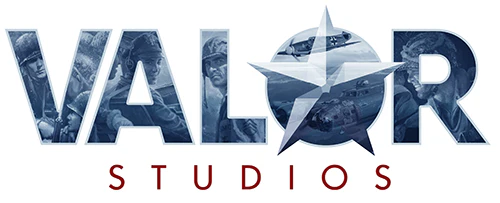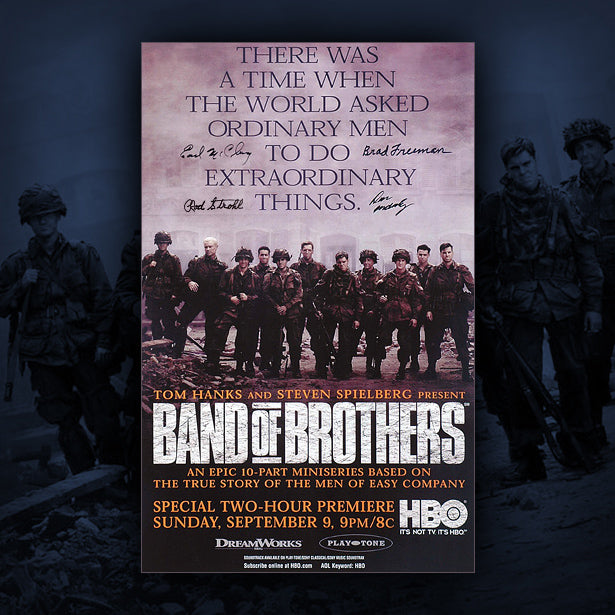-
This official Band of Brothers movie poster depicts the actors playing Dick Winters, Buck Compton, Don Malarkey and other E-Company veterans.
BATTLE DAMAGE VERSION
Has a slightly bent corner, see photo in the carousel. Hand-signed in black marker, by Easy Company paratroopers Earl McClung, Ed Tipper, Rod Strohl, and Brad Freeman. Includes a Certificates of Authenticity.
COLLECTOR VERSION
We have a small number remaining, hand-signed in black marker, by Easy Company paratroopers Don Malarkey, Earl McClung, Rod Strohl, and Brad Freeman. Includes a Certificates of Authenticity.
Shipping added in checkout // poster size: 11" x 17" // ships rolled in a tube
-
BRAD FREEMAN
Bradford Freeman was born and raised in the lush Mississippi farmlands of Lowndes County, near Columbus. He was one of 8 children, 3 of whom fought in the war. After high school graduation he enrolled in Mississippi State University, which he attended for one semester before enlisting in the US Army on December 12, 1942.
He joined the paratroopers, following in the footsteps of his older brother, who became an officer in the 11th Airborne. Freeman was assigned to the 506th PIR., 101st Airborne at Alderbourne, England in February 1944. There, he trained under the watchful eye of mortar squad leader Don Malarkey and platoon leader Bill Guarnere, both of whom he describes as great fighting men.
On D-Day Freeman parachuted into Normandy in Malarkey’s stick, forming up and fighting with Sgt. Chuck Grant until they joined the company near Brecourt Manor. Freeman vividly remembers the fierce fighting at Carentan, where he feels E-Company came together as a combat unit.
Freeman participated in the invasion of Holland, and recalls endless patrols and “scary” night outpost duty on the banks of the Rhine. Following Market Garden Freeman survived the brutal weather and constant shelling in the Bois Jacques woods at Bastogne only to be wounded by a “screaming mimi” (Nebelwerfer rocket) in Easy Company’s attack on Foy. Following release from a hospital in England, Freeman joined up with HQ Staff in Berchtesgaden in April 1945, and later with his E-Company comrades in Kaprun, Austria.
After the war Brad Freeman went back to Mississippi State University for a semester, and then returned to help run a 197 acre family farm in Lowndes County. He later worked with the US Postal Service, retiring after 32 years of service.
DONALD MALARKEY
Donald Malarkey was born in Astoria, Oregon in 1921. He was in his first semester at the University of Oregon in the fall of 1941 when the Japanese attacked Pearl Harbor. After the attack, Malarkey tried enlisting in the Marines, but he was turned down because of dental problems.
In July 1942, he volunteered for the paratroops of the United States Army, becoming a member of Easy Company, 2nd Battalion, 506th Parachute Infantry Regiment of the 101st Airborne. He received the Bronze Star Medal for his involvement in the Brécourt Manor assault on D-Day in Normandy. During his time with Easy Company he was promoted to the rank of Tech Sergeant. Malarkey was involved in combat in Normandy, Operation Market Garden in Holland, Bastogne, and Germany.
In the 2001 miniseries, "Band of Brothers," Malarkey was portrayed by actor Scott Grimes, now a star of the TV show E.R. Don Malarkey, along with his longtime friend Buck Compton, are today recognized as two of the most memorable characters of the Band of Brothers mini-series.
EARL MCCLUNG
Earl was born on April 27, 1923 at the Colville Indian Reservation in Inchelium, Washington. While in his senior year of high school, on Feb 15, 1943, McClung was drafted into the U.S. Army. He underwent infantry basic training at Camp Walters, Texas, and volunteered for Airborne training at Fort Benning, Georgia.
McClung joined Company E, 506th Parachute Infantry Regiment, at Fort Bragg, North Carolina before shipping out to England. He participated in all of 101st Airborne Division's major campaigns in the European Theatre of Operations. He received two Bronze Star awards for valor and the Purple Heart for being wounded in the line of duty.
McClung left the service in 1947 and worked for the Postal Service, for 17 years. He then worked for 13-years as a game warden on the Collvile Indian Reservation, a post from which he retired in 1988.
- We recommend that all autographed items be displayed or stored using archival quality, acid free materials away from any moisture or strong light exposure. When framing art/photographs/posters, we recommend locating a framer who is familiar with archival framing, has a storefront so you can see examples of their work, is not within a big box store, and has full insurance in the event an accident occurs while framing your item.
UV blocking glass/acrylic, spacers, and acid free framing materials must be used to protect the image and signatures. Fading can occur even if an item is not displayed in direct sunlight (even a light bulb omits UV rays) so UV blocking glass/acrylic is necessary. Acid free spacers or mat board must also be utilized to prevent the signatures from direct contact with the top layer of glass/acrylic. If a signature is pressed against the clear material it will lift off the photo/poster/print and deteriorate.
In order to retain full value of your item, your art or collectible should be able to be removed from its frame or storage container and still be in the same original condition as it was when purchased from Valor Studios.
If you decide to store one of our art prints/collectibles without getting it framed, then we recommend flat storage in either an acid free art sleeve or between pieces of acid free foam core. The item should be stored in a dark and dry location, several inches off the floor. We do not recommend storing prints/posters/photos in tubes for any extended length of time.












